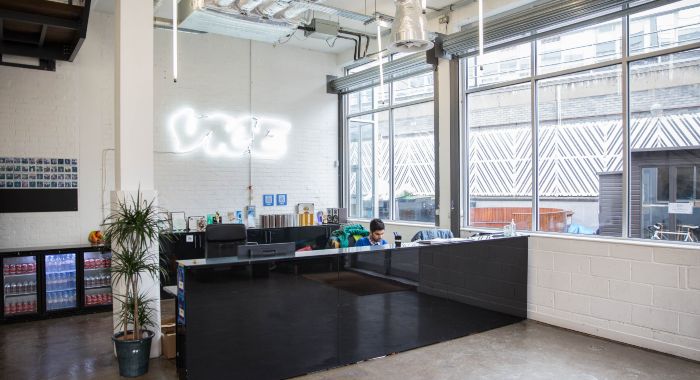As first published on Broadly, Sept 2015 by Zing Tsjeng
Here's a proposition: Let's say you're a cisgender person who's never met a trans guy or girl before. You've seen a few episodes of Orange Is The New Black, you know vaguely about Miley Cyrus being genderqueer, but you're not fully on board with the cause because well, it all seems a little distant. Would you change your mind if you had a free manicure?
That's what 23-year-old trans activist Charlie Craggs is betting on. Her "Nail Transphobia" campaign, which began as a university project, wants to change hearts and minds through a mobile nail salon. Over the past year, she and a crew of queer and trans nail artists have staged trans rights pop-ups at London Pride, the Royal Academy of Art, and the Victoria & Albert Museum in England.
"It's all about getting people who haven't met a trans person before," Craggs explained.
"Usually the people who get their nails done have never met a trans person, but they'll often have a lot of preconceived ideas—usually from the media, so quite negative. I get a chance to meet them and bond; I basically get to educate them, but also talk about things like Beyonce and the weather. It humanizes the issue. They see I'm just a nice person like them."
If it sounds like a modest undertaking, that's because it is—Craggs is a one-woman show, buying all her own equipment from outlet cosmetics stores ("I'll buy, like, a million fake nails in bulk") and running her own press. When I met her at a feminist zine fair at the Feminist Library in London, she brought a downsized version of her salon: a pink fluffy telephone, a vase of plastic flowers, and a tray full of sugary cookies.
"When I decided to transition, I was googling trans stuff," Craggs said. "When you type in 'transsexual,' all that comes up is porn or the death rate, so it's like, Wow. Either I've got to choose to be a prostitute or be murdered, or be both. Every 29 hours a trans woman is killed, which is crazy to me. I wanna do something about this. I wanna put up a fight."
People have come up and grabbed my chest in public to see if I'm a girl; I've had glass bottles thrown at me.
While transphobic hate crime in Britain has yet to reach the rates of that in the US, where the murder rate of trans people has hit an all-time high, acceptance remains a slow and steady battle in the UK. The country's leading equality charity for gay and bisexual men and women, Stonewall, only just announced this year that it would add transgender rights to its campaign.
While trans women are feted on the cover of Time and Vanity Fair, and becoming the subjects of big-budget films like The Danish Girl, we are still a long, long way off equality. Planet Transgender editor Amy Walker pointed out the conundrum of trans acceptance in a recent column: "Trans people are getting more of the spotlight than we have in the past, but we're sure as hell not being listened to or respected yet," she wrote of celebrities throwing their support behind trans rights.
A recent Mashable feature on American transgender teenagers notes that more than 50 percent of young trans people will attempt suicide before they turn 20.
Craggs said that the "everyday struggle" for British trans people remains just as dire. "It's really, really, really bad," she told me. "I identified as a gay guy my whole life until I transitioned. I thought being gay was hard; this is like ten steps harder. People have come up and grabbed my chest in public to see if I'm a girl; I've had glass bottles thrown at me; I've been attacked. I'm scared to leave the house most days."
For Craggs, Nail Transphobia isn't just an outreach project with the added benefit of mani-pedis, but a vital means of creating trans allies—ones who could potentially save another person's life."The amount of times that I'm in the street and I'll be getting harassed or abused," she sighed. "I might not be here now if someone hadn't stepped in, so it's really important to have allies. A transphobic person might realize how stupid they are when a cisgender [person] or anyone else says, 'Leave them the fuck alone.' On Facebook, they might just comment [on a transphobic post] and be like, 'Actually you need to pipe down, that's really not the case.' Ripples make waves."
Craggs, who grew up on a council estate in one of the poorer areas in west London, says she has experience winning people over. "My dad is like a big macho guy, he was a boxer and then a builder—big man hands, with tattoos and hair." He's gotten his nails done by Craggs. Streetwise schoolgirls from housing projects have followed her on Instagram en masse after meeting her at outreach workshops. Once, after getting their nails painted, a five-year-old politely informed Craggs that her teddy bear was also transgender.
"If I was on the street, I could argue with every person that looks at me funny, but I just don't have the energy," Craggs told me.
"My activism is positive activism—it's not about being like 'fuck these people.' I'm all about 'honey, have a [cookie] and a pink telephone, it's all positive, it's all fun, it's all good intentions. For me, that's what I wanna be doing [...] That's what I'm trying to do with my life: to get to a point where I can lift myself out of my reality."

